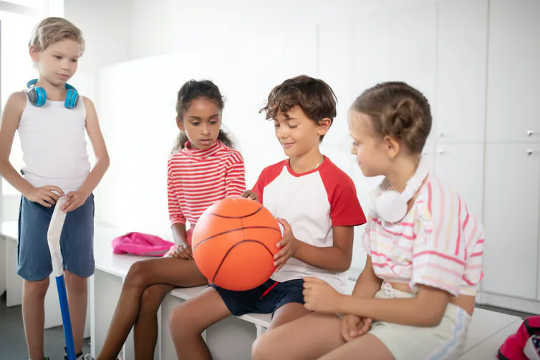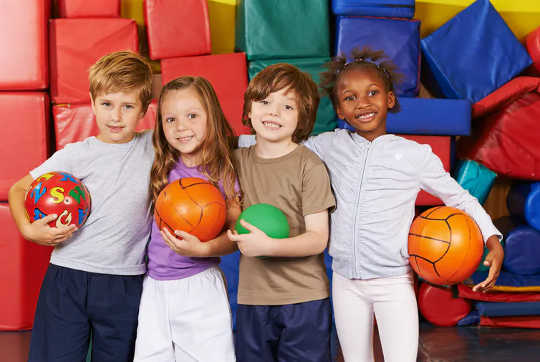There are growing concerns about the long-term effects of the COVID-19 pandemic on children and young people.
In some cases, the legacy of the pandemic may be with us already. Teachers and school leaders are increasingly worried about the amount of catch up work pupils will need to offset their lost learning. We are starting to learn more about the social and emotional cost of the pandemic. Support is needed for a generation of young people who have lost a significant stage of their development.
Physical Education (PE) is ideally placed to support children’s all-round development. As well as developing physical skills, PE teaches children intellectual skills, helps them navigate complex social situations, and nurtures their emotional development. However, these wide-ranging benefits are often overlooked, and PE is regularly underutilised as an educational tool.
More than exercise
During the national lockdown, fitness coach Joe Wicks’s online exercise classes for children drew national attention to the importance of physical activity and its associated benefits, such as increased mobility and better mental health. Getting children moving during lockdown is commendable, especially in response to high obesity levels in England.
Get The Latest By Email
Joe Wicks putting P5 through their paces #PEwithjoe @thebodycoach 😅💪🏽 pic.twitter.com/IGCMEa56wc— St Mary’s Primary School (@StMarysPrimPais) August 30, 2020
However, the decision to label these classes “PE with Joe” reinforces a narrow understanding of what PE is and what it is capable of. Wicks’s classes provided an inspiring and engaging opportunity for physical exercise, but did not – and perhaps never could – capture the essence of physical education.
The wide-ranging benefits of physical activity are frequently used to justify PE’s place in the curriculum.
However, PE should be a key part of the school curriculum for its unique potential to support whole-child development, which includes but is not limited to the promotion of physical health.
Multiple benefits
The interactive and collaborative nature of PE can foster self-confidence, empathy and understanding by encouraging children to work together and support each other. An exercise class, which takes a one-way instructional approach, invariably lacks the opportunities for these aspects of learning to take place.
PE encourages pupils to be creative, solve problems, and plan for the future. By working together, pupils can address physical and intellectual challenges while learning to communicate and manage risk and conflict.
An example would be children creating their own physical game, its rules, equipment, and space requirements. The children would allocate group roles and take ownership of their own learning by planning the game, implementing it, and supporting others’ engagement with it. Finally, they would reflect on the impact of the game on themselves and others.
Alongside the physical development outcomes the activity would provide, this approach would also contribute to cognitive development, through decision making, problem solving and organising. It would encourage social awareness – through communication, sharing and understanding – and foster emotional development, helping children develop confidence, self-awareness and motivation.

Physical Education (PE) can teach children to work together and resolve conflicts. Dmytro Zinkevych/Shutterstock
PE can also contribute to pupils’ language and writing skills. For instance, pupils could engage in PE-related research activities, such as exploring the historical context behind the Olympic Games, how it has evolved over time, and go on to present their findings. They could read and write PE-related poetry. These opportunities may have been underutilised or ignored during lockdown.
These social and emotional attributes should run in parallel and complement the physical and cognitive outputs most frequently associated with PE, such as fitness, skill development, leadership and resilience. Unfortunately, this is not the popular view of PE, as it is often viewed as just sport, play or games.
Better support for schools and teachers is needed to harness the full spectrum of learning potential PE provides. A starting point is to broaden understanding about the role PE can play in schools.
Not just games
PE teachers’ values, beliefs and practices like many others in society are often nested in their own sporting backgrounds and experiences. The reality of PE in schools is that it continues to be dominated by sporting activities such as football, hockey, netball and rugby. However, this focus on sport performance is potentially limiting the holistic potential of PE.
The learning intentions for PE in this post-lockdown era should be constructed to develop the life and learning skills that children have missed out on during their social isolation.
Teachers and schools should be encouraged to be brave, and incorporate tasks promoting speaking skills, literacy and arts-based work into PE classes.
In order to successfully counter the learning losses during lockdown, we need to think differently about the place of PE in schools and the value it can provide to children. Only then will PE be prioritised, not pushed aside, in schools and society.![]()
About the Authors
David Grecic, Director of the Institute of Coaching and Performance, University of Central Lancashire; Andrew Sprake, Lecturer in Physical Education, University of Central Lancashire, and Robin Taylor, Senior Lecturer in Coaching and Performance, University of Central Lancashire
This article is republished from The Conversation under a Creative Commons license. Read the original article.
books_exercise








